What Does Section 8 Look for in a Background Check?
As a potential Section 8 applicant, you may be wondering what kind of background check the program will conduct and actually what Section 8 look for in a background check. Here’s what you need to know.
Section 8 is a government-funded program that provides housing assistance to low-income families and individuals. The program is administered by local housing authorities, which means that each authority has its own eligibility requirements and application process.
Recommended to read: Income Limits For Section 8 Housing
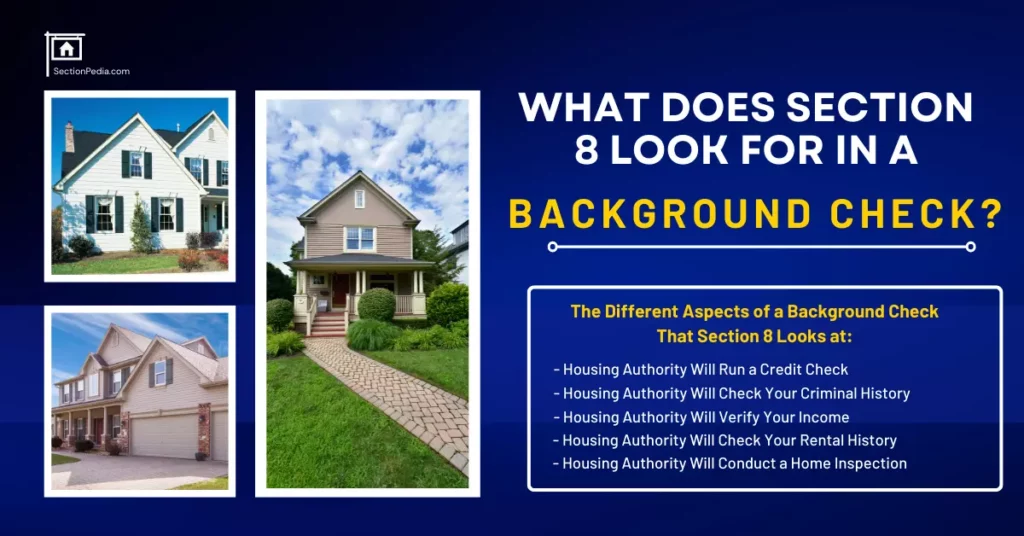
When it comes to background checks, each housing authority has its own policies and procedures. However, there are some commonalities among most housing authorities. Here’s what you can expect during the background check process:
the Different Aspects of what section 8 look for in a background check
Let me explain this in more detail.
1. The Housing Authority Will Run a Credit Check
The first thing the housing authority will do is run a credit check. They’ll be looking for any red flags, such as a history of late payments, collections, or bankruptcies.
2. The Housing Authority Will Check Your Criminal History
The housing authority will also conduct a criminal background check. They’ll be looking for any felonies or misdemeanors on your record.
Recommended to read: Get Section 8 With a Felony
3. The Housing Authority Will Verify Your Income
In order to qualify for Section 8, you must meet certain income requirements. The housing authority will verify your income by requesting tax records and pay stubs.
4. The Housing Authority Will Check Your Rental History
The housing authority will also check your rental history to make sure you’ve been a good tenant in the past. They’ll be looking for any evictions or complaints from previous landlords.
5. The Housing Authority Will Conduct a Home Inspection
Finally, the housing authority will conduct a home inspection to make sure the home is up to code and safe for occupancy.
If you’re thinking of applying for Section 8, it’s important to be prepared for the background check process. Be sure to gather all the necessary documentation, such as tax records and pay stubs, in advance. And, if you have any concerns about your background, be sure to address them with the housing authority.
Section 8 Background Check Process: What Do You Need to Know?
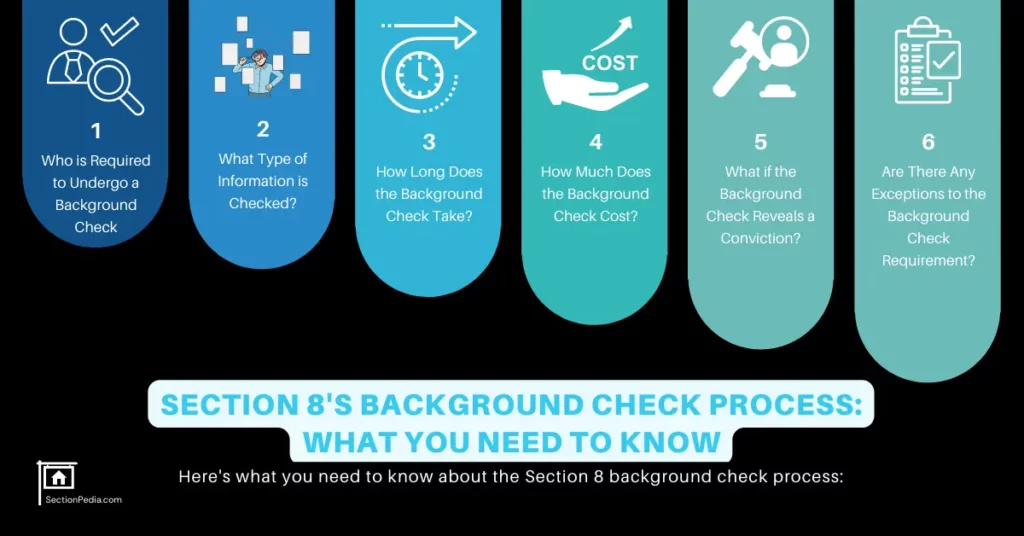
As a housing program, Section 8 provides assistance to low-income families so they can afford a place to live. A key part of this program is the background check process, which is designed to help ensure that participants are safe and fit to live in subsidized housing.
Here’s what you need to know about the Section 8 background check process:
1. Who is Required to Undergo a Background Check?
All adult members of a household who are 18 years of age or older must undergo a criminal background check. This includes any family members or roommates who may be living in the subsidized unit.
2. What Type of Information is Checked?
The criminal background check will look for any convictions of felonies or serious misdemeanors. This includes any charges that are currently pending or that have been dismissed within the past seven years.
3. How Long Does the Background Check Take?
The criminal background check is typically completed within two weeks. However, if there is a delay in receiving information from law enforcement agencies, the process may take longer.
4. How Much Does the Background Check Cost?
There is no fee for the criminal background check.
5. What if the Background Check Reveals a Conviction?
If the criminal background check reveals a conviction, the housing authority will evaluate the nature and severity of the offense to determine if the household is eligible for housing assistance.
6. Are There Any Exceptions to the Background Check Requirement?
There are a few exceptions to the background check requirement. For example, households that include a victim of domestic violence, stalking, or sexual assault may be eligible for an exception.
The Section 8 background check process is an important part of the program that helps ensure the safety of participants and the communities in which they live. By understanding the process and what is required, you can help make sure that your family is eligible for housing assistance.
How to Make Sure That Your Background Check Will Meet Section 8 Standards
The housing assistance program known as Section 8 is administered by the Department of Housing and Urban Development (HUD). It provides rental assistance to low-income families, the disabled, and the elderly. In order to be eligible for this program, applicants must pass a background check.
There are a few things that you can do to make sure that your background check will meet Section 8’s standards.
- First, order a copy of your own criminal history report. This will give you an idea of what information is being reported about you.
- Next, take some time to clean up your credit report. This is especially important if you have any outstanding debts or collections.
- Finally, be sure to disclose any and all relevant information on your application. This includes any arrests or convictions, as well as any evictions. Section 8 is very strict about background checks, so it’s important that you are honest and upfront about your history.
Tips for Passing a Section 8 Background Check
As a property owner, you want to make sure you are leasing your units to qualified, responsible tenants. One way to do your due diligence is to require all applicants to go through a background check. If you are new to the Section 8 program, you may be wondering what exactly a background check entails and how to go about running one.
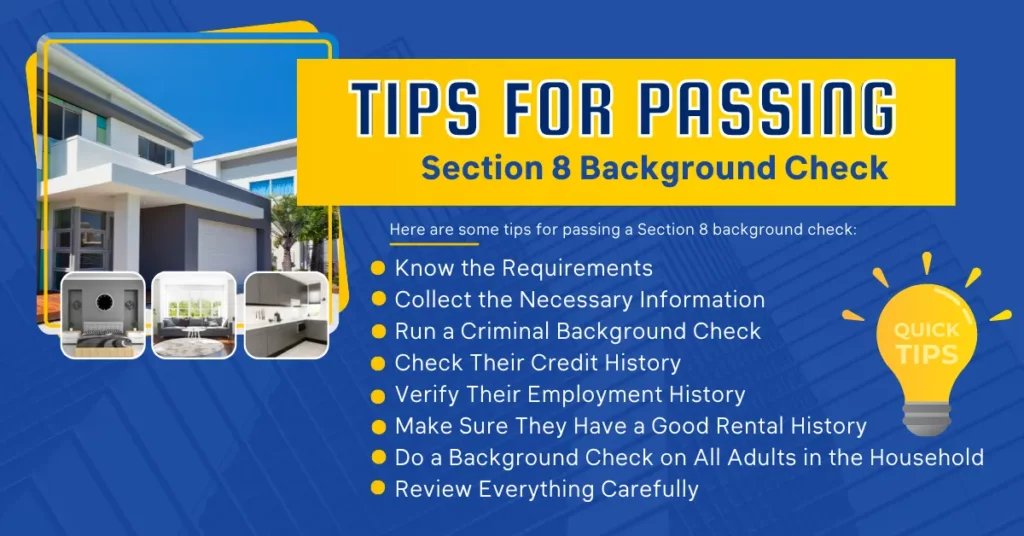
Here are some tips for passing a Section 8 background check:
1. Know the Requirements
Each PHA has different requirements for what they consider to be a “passing” background check. Make sure you are familiar with your PHA’s specific guidelines.
2. Collect the Necessary Information
You will need to collect some basic information from your applicants, such as their full name, date of birth, and current address. You will also need their Social Security number in order to run a credit check.
3. Run a Criminal Background Check
One of the most important aspects of a background check is a criminal history check. This can be done through a variety of online services.
4. Check Their Credit History
Your applicants’ credit history will give you a good idea of their financial responsibility. You can request a copy of their credit report from the major credit reporting agencies.
5. Verify Their Employment History
It is important to verify that your applicants are employed and have a steady income. You can do this by requesting copies of their pay stubs or by calling their employer directly.
6. Make Sure They Have a Good Rental History
If your applicants have a history of late rent payments or evictions, this is a red flag. You can check their rental history by contacting their previous landlords.
7. Do a Background Check on All Adults in the Household
If your applicants have any adult family members or roommates, you will need to do a background check on them as well.
8. Review Everything Carefully
Once you have all of the information, take some time to review it carefully. Look for any red flags that might indicate that an applicant is not a good fit for your property.
Running a background check is a good way to screen applicants and make sure you are leasing to responsible tenants. By following these tips, you can help ensure that your Section 8 background check is successful.
By following these tips, you can give yourself the best chance of passing a Section 8 background check.
Can A Felon Get Section 8?
Whether a felon can receive Section 8 housing assistance depends on several factors, including the nature of their criminal history, the policies of the local housing authority, and federal regulations. While federal law does not automatically disqualify individuals with a criminal record from receiving Section 8 benefits, there are some important considerations:
- State and Local Regulations.
- Nature of the Conviction.
- Waiting Periods. Some housing authorities impose waiting periods for individuals with certain types of criminal convictions. During this waiting period, an applicant may be ineligible for Section 8 assistance.
- Individual Assessments.
- Background Checks.
Housing authorities typically conduct background checks on all adult members of a household during the application process. It’s essential to be honest about your criminal history when applying for Section 8, as providing false information can lead to disqualification.
Overall, the eligibility of a felon for Section 8 housing assistance can vary widely depending on individual circumstances and local policies.
If you or someone you know is a felon and is interested in Section 8 housing, it’s advisable to contact the local housing authority or consult with an attorney who specializes in housing or criminal law to better understand the specific rules and options in your area.
What Disqualifies You From Section 8 In California?
The eligibility criteria and disqualifications for Section 8 housing assistance in California are similar to those in other parts of the United States, but they can also be influenced by state-specific policies and local housing authorities.
So, what will disqualify you from Section 8:
Income. Section 8 is primarily intended for low-income individuals and families. If your income exceeds the income limits set by the program, you may not qualify. Income limits can vary by region and can change annually.
Immigration Status. Some non-U.S. citizens may not be eligible for Section 8 assistance, depending on their immigration status. Eligibility can vary based on factors such as citizenship, immigration status, and the type of assistance sought.
Criminal History. As mentioned in the previous response, the nature and seriousness of your criminal history can affect your eligibility for Section 8 in California. Certain convictions, particularly for drug-related offenses, violent crimes, and certain sexual offenses, may disqualify you. Local housing authorities may also have specific policies in place regarding criminal history.
Evictions. If you have been evicted from federally assisted housing for drug-related criminal activity or other lease violations, you may be ineligible for Section 8 assistance for a specified period.
Outstanding Debt to Housing Authorities. If you owe money to a public housing agency or have violated any terms of a previous housing assistance program, you may be disqualified until the debt is paid or the violation resolved.
Fraud or Misrepresentation. Providing false or fraudulent information on your application can lead to disqualification. Housing authorities perform background checks and verify the information you provide.
Failure to Meet Citizenship or Eligible Immigrant Requirements. While Section 8 does not have strict citizenship requirements, individuals who are not U.S. citizens must meet certain eligibility criteria. Failure to meet these criteria may disqualify you.
Inadequate Documentation. You may be disqualified if you cannot provide the required documentation to verify your income, household composition, and other eligibility criteria.
It’s important to remember that the eligibility criteria and policies can vary between local housing authorities in California, so it’s advisable to contact the specific housing authority in your area or consult with a local agency that administers the Section 8 program to get detailed and up-to-date information on eligibility requirements.
Additionally, be honest and forthright when applying, as providing false information can result in disqualification or termination of assistance.
FAQs
What kind of background check does HUD do?
HUD conducts background checks primarily focused on criminal history, rental history, and income verification for Section 8 housing applicants. This ensures eligibility and suitability for housing assistance.
How far back does hUD background check go?
HUD’s background checks usually cover the past seven to ten years, but specific policies can vary.
What does hud look for on your background check?
HUD’s background check primarily examines criminal history, rental history, income verification, and housing assistance history to assess eligibility for housing assistance programs.
How far back does Section 8 background check go?
The timeframe for Section 8 background checks varies, but they typically focus on recent criminal activity. While there isn’t a specific limit, serious offenses within the past few years may impact eligibility. It’s best to check with your local Public Housing Agency for their specific policies.
Does Section 8 do background checks?
Yes, Section 8 housing programs typically conduct background checks as part of the application process.
Conclusion
Section 8 housing assistance programs typically conduct thorough background checks on all adult members of an applicant’s household. The purpose of these background checks is to assess an applicant’s suitability for the program and to ensure that housing assistance goes to those in genuine need.
It’s important to note that the specific eligibility criteria and policies can vary between different housing authorities and regions. For the most accurate and up-to-date information, it’s advisable to contact your local housing authority or agency that administers the Section 8 program in your area.
Being truthful, providing accurate documentation, and understanding the specific eligibility requirements in your area are key steps in the application process for Section 8 housing assistance. If you have concerns about your eligibility, it’s a good idea to consult with the local housing authority or an attorney who specializes in housing law for guidance.


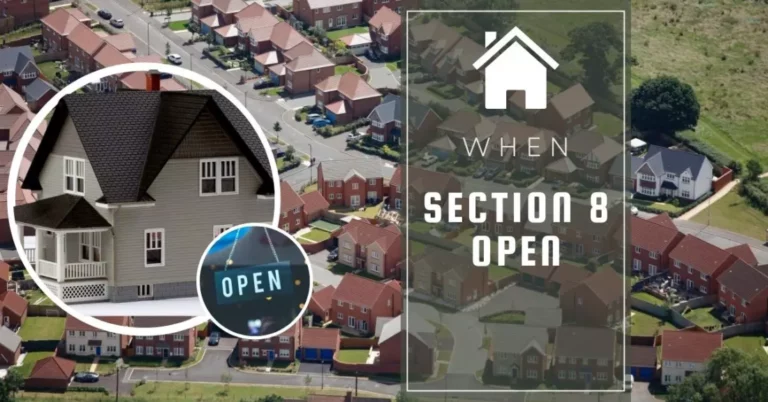
![What is Section 8 housing in Michigan: [Best Explained]](https://sectionpedia.com/wp-content/uploads/2024/04/Main-photo-Secton-8-768x429.jpg)

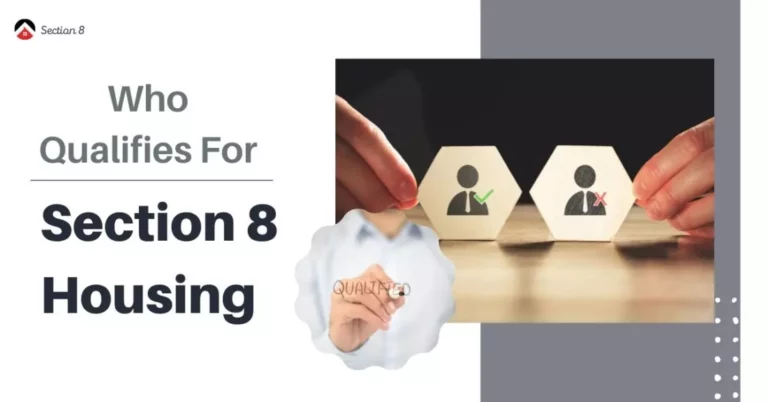


Now I know what to do, because before reading the article there were so many questions
Very cool. Thanks